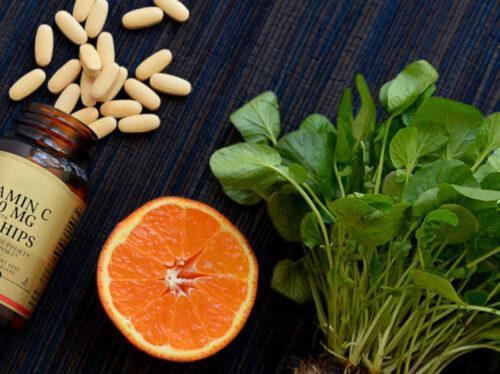
Benefits of Hibiscus
Hibiscus helped save our puppy We found a pedigree Golden retriever for sale for $50 in the local paper. At the time, they were selling

I have been supplementing two important vitamins and a mineral to support my general health and well-being and to now protect myself from possible harsh consequences of covid-19 infection.
Vitamin C is perhaps the most popular supplement taken to protect against infection due to its important role in immune health.
Oxidative stress can negatively affect immune health and is linked to numerous diseases.
Vitamin C functions as a powerful antioxidant, protecting against damage induced by oxidative stress, which occurs with the accumulation of reactive molecules known as free radicals.
It also supports the function of various immune cells and enhances their ability to protect against infection.
Supplementing vitamin C has been shown to reduce the duration and severity of upper respiratory tract infections, including the viral infection known as the common cold (which is a cousin of covid-19).
A large review of 29 studies in 11,306 people demonstrated that regularly supplementing with vitamin C at an average dose of 1–2 grams per day reduced the duration of colds by 8% in adults and 14% in children.
Interestingly, the review also demonstrated that regularly taking vitamin C supplements reduced common cold occurrence in individuals under high physical stress, including marathon runners and soldiers, by up to 50%.
Additionally, high dose intravenous vitamin C treatment has been shown to significantly improve symptoms in people with severe infections, including sepsis and acute respiratory distress syndrome (ARDS) resulting from viral infections.
The Standard American Diet (SAD) provides a minimum of Vitamin C, 60 mg, which generally prevents scurvy in our population, but is by no means an optimal intake.
Whereas vitamin C supplements may significantly improve immune health, especially in those who don’t get enough of the vitamin through their diet.
For adults, the recommended daily amount for vitamin C is 65 to 90 milligrams (mg) a day, and the upper limit is 2,000 mg a day or to bowel tolerance which is an amount that won’t cause diarrhea.
I take 2,000 mg/day and up to 8,000 mg/day for fighting infections.
I try to get most of my nutritional requirements met by eating organically grown whole foods, but sometimes that just isn’t sufficient to meet my needs.
Although I can get Vitamin C from green leafy vegetables and citrus fruits such as oranges, I would need to eat forty oranges (with more than two thousand calories and a cost of $11) to equal what I get from two supplement tablets.
Hence the need for supplementation.
Vitamin C was first chemically synthesized in the early 1930s and is known as ascorbic acid.
Vitamins synthesized in a laboratory are made to mimic the way natural vitamins act in our bodies and are the most common products available.
But they aren’t the same as their natural alternatives.
Many synthetic vitamins lack the transporters and co-factors associated with naturally occurring vitamins and lack the trace minerals that assist their absorption.
Rose hips contain the natural form of vitamin C and also offer bioflavonoids such as hesperidin and rutin, as well as other vitamins, enzymes and minerals that control the way the body recognizes, metabolizes and uses them to make what it needs.
Hesperidin is said to improve circulation, reduce inflammation, and help fight cancer.
Rutin has powerful antioxidant properties. It also helps our body produce collagen and use vitamin C.
The bioavailable Vitamin C supplement I take is in the natural form from rose hips, with additional hesperidin from lemon, orange and grapefruit peel and additional rutin from the Japanese pagoda tree, Sophora japonica.
This is available as MAXI C-COMPLEX in health food stores or online.
Most folks are deficient in Vitamin D.
Although I live near the beach in Southern California and generally get plenty of sunshine, I have been supplementing Vitamin D for years.
It has many health benefits.
Vitamin D is a fat-soluble vitamin essential to the health and functioning of our immune system.
It enhances phagocytosis, pathogen-fighting of monocytes and macrophages — white blood cells important for our immune defense.
Studies show that vitamin D supplements may improve response to antiviral treatments in people with certain infections, including hepatitis C and HIV.
Studies also show that Vitamin D decreases inflammation.
Research on inflammation has created a shift in medical thinking.
For a long time it has been viewed as a necessary, even beneficial, response to illness or injury, which is true for acute inflammation as with a sprained ankle.
But now both observational studies and laboratory research are indicating that chronic inflammation is the common, causative factor in many diseases.
For example, low vitamin D levels are associated with an increased risk of upper respiratory tract infections, including influenza and allergic asthma.
In a 2019 review of randomized control studies in 11,321 people, supplementing vitamin D significantly decreased the risk of respiratory infections in people deficient in this vitamin and lowered infection risk in those with adequate vitamin D levels.
Depending on blood levels, anywhere between 1,000 and 4,000 IU of supplemental vitamin D per day is sufficient for most people, though those with more serious deficiencies often require much higher doses.
I take 2,800 IU Vitamin D-3 daily in the form of colecalciferol. Since it is oil soluble, I take it with my evening meal which generally contains more fats than breakfast (mostly fruit) or lunch (mostly leafy vegetables).
Zinc is a mineral I rely on for my health and well-being.
It’s commonly added to supplements and other healthcare products like lozenges that are meant to boost the immune system.
Zinc is also needed for immune cell development and communication and plays an important role in inflammatory response.
A deficiency in this nutrient significantly affects your immune system’s ability to function properly, resulting in an increased risk of infection and disease, including the common cold and pneumonia.
What’s more, supplementing with zinc may be beneficial for those who are already sick.
In a 2019 study in 64 hospitalized children with acute lower respiratory tract infections (ALRIs), taking 30 mg of zinc per day decreased the total duration of infection and the duration of the hospital stay by an average of two days, compared with a placebo group.
Supplemental zinc may also help reduce the duration of the common cold.
Zinc deficiency affects around two billion people worldwide and is very common in older adults.
In fact, up to 30% of older adults are considered deficient in this nutrient.
Taking zinc long term is typically safe for healthy adults, as long as the daily dose is under the set upper limit of 40 mg of elemental zinc.
Excessive doses may interfere with copper absorption, which could increase your infection risk.
Organically grown pumpkin seeds are a good source of zinc.
For male adults aged 19 years and above, the Office of Dietary Supplements recommends a daily intake of 11 mg of zinc for men and 8 mg for women.
I take a zinc supplement that provides 24 mg in the form of zinc picolinate.
To obtain that much from pumpkin seeds, which also contain a good bit of healthy fat, would require eating more than 300 grams of seeds (with more than 1300 calories and a cost of $5 per day).
I asked my friend Holly Frazier who is a clinical herbalist (Self-Heal Grad) and microbiologist who works with Covid in a lab to add to this post if needed. Here is her much appreciated input:
The one thing I would add is magnesium. A good quality one like magnesium glycinate or magnesium chloride. Other magnesium’s have a notoriously low absorption rate but are much cheaper. It is estimated 85% of people are deficient. I was one of them. Being a coffee drinker made it worse.
I was taking 10,000 IU of Vit D daily for months and my levels never went over 25 ( deficit). In fact I had too high levels of calcium because Vit D enhances calcium absorption. I got heart palpitations from too much calcium and I wasn’t taking any calcium supplementation.
I learned magnesium enhances Vit d absorption as well as activates it. This is what the lymphocytes use for signaling during viral infections otherwise they are circulating zombies.
I now take 1000 daily of D3 with K2 with magnesium (K2 keeps calcium from hardening the arteries) and my levels are over 50, a good level.
Vitamin C should never be taken with sugar as in juice. The receptor is the same for glucose and Vit C. Therefore there is a competitive binding problem.
I take my C (10-12 grams daily while I’m playing with Covid, any more and I get diarrhea which as you say is your personal limit)
We are one of the few animals that can’t make C from glucose.
I read a study that goats produce a serum level of 100,000 ml/dl when sick. This is INSANELY HIGH. You’d have to probably eat more than 100 grams of C to get to this level and unlikely you could absorb it.
This is why IV vitamin C is very effective for people who have Covid or other diseases. It has been shown the lymphocytes use vitamin C for fuel so when they are very active during an infection they BURN through serum levels of vitamin C quickly.
Thomas DeLauer has a good short video on D C zinc and magnesium and how they work together. If you start at 1:12 you’ll skip the adds for keto products which we do not endorse.
Understand that some supplements can interact with prescription or over-the-counter medications and that some may not be appropriate for people with certain health conditions.
Be sure to talk with your healthcare provider before starting any supplements.
Also understand that no supplement, diet, or other lifestyle modification other than physical distancing, also known as social distancing, and proper hygiene practices (hand washing) can protect us from covid-19.
Keeping your immune system healthy is key to preventing infection and disease.
Making healthy lifestyle choices by consuming nutritious foods and getting enough sleep and exercise are some of the most important ways to bolster your immune system.
Teaching comprehensive holistic education since 1985.
We are currently offering interactive hybrid courses including Herbal Fundamentals, Energy Healing, Aromatherapy and Clinical Herbology
Hybrid means you may choose to participate in each individual class in the hybrid course online or in person.
All of our products are made with love from organic, all-natural and ethically sourced ingredients.
We began making and perfecting our own herbal remedies more than thirty years ago and offer our favorite products for purchase.

Hibiscus helped save our puppy We found a pedigree Golden retriever for sale for $50 in the local paper. At the time, they were selling
Hawthorn Berry Hawthorn is known as the heart herb for its many benefits as a heart tonic. The berry has been a key part of

Can you take herbal supplements to arm your immune system? You probably know that zinc, vitamin D and vitamin C are gotta-have-its. How about herbal

While attending San Diego State College in the early seventies, my work-study job was in the vivarium, a room for keeping and raising animals for